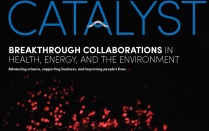
Johannes Hachmann
PhD
Research Topics
Computational chemistry and materials science; virtual high-throughput and Big Data; machine learning; electronic structure theory and methods; quantum effects in catalysis and materials; rational design
Our research is concerned with one of the most demanding and simultaneously rewarding challenges for computational chemistry: the accurate modeling of coordination compounds and predictive simulation of catalytic processes. We address real-life chemical problems ranging from transition metal complexes with exotic properties to bio-, organo-, and metal-catalysis. A second area of interest is the development of electronic materials, in particular for renewable energy technology. Quantum effects play an important role in both these areas, and we employ cutting-edge computational techniques in carefully designed studies to account for them.

Hachmann Research Group, photo taken July 2018





